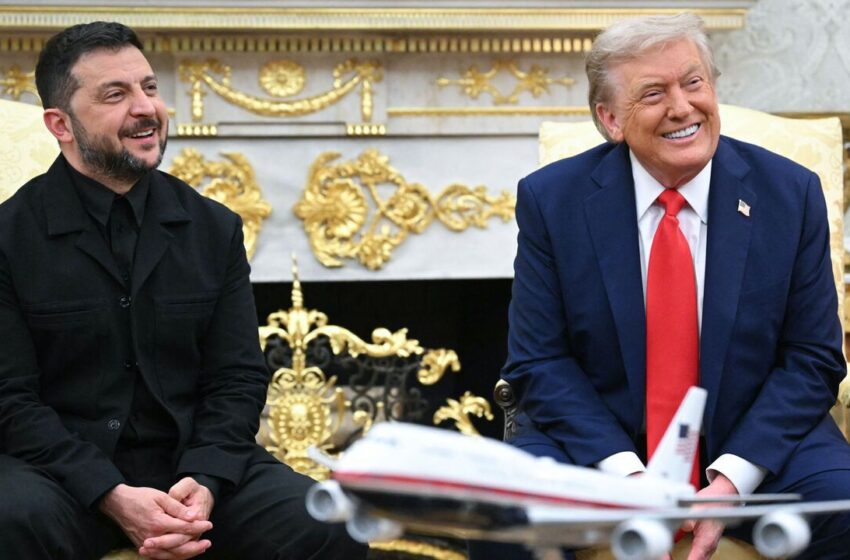“You can’t shake hands with a murderer”: Why Ukrainians oppose a Zelensky-Putin meeting

Trump–Zelenskyy meeting reshapes Russia–Ukraine war talks
In the wake of high-level discussions at the White House on Monday, many Ukrainians in Kyiv have made their stance clear: they do not support direct talks between President Volodymyr Zelensky and Russian President Vladimir Putin.
The meeting in Washington, which brought together Zelensky, U.S. President Donald Trump, and European leaders, sparked both relief and skepticism back home. Residents of the Ukrainian capital welcomed Zelensky’s firm position against making territorial concessions to Moscow, viewing it as a sign of resilience in the face of ongoing aggression.
However, Trump’s reported push for a face-to-face meeting between Zelensky and Putin has stirred unease. Several Ukrainians interviewed by CNN said such an encounter would be unacceptable, with one remarking that “you cannot shake hands with a murderer.”
For many in Kyiv, the priority remains safeguarding Ukraine’s sovereignty and preventing any deal that could legitimize Russia’s control over occupied regions.
Why Ukrainians Oppose a Zelensky-Putin Meeting
The suggestion of a face-to-face meeting between Ukrainian President Volodymyr Zelensky and Russian President Vladimir Putin continues to stir heated debate among Ukrainians. While diplomacy is often viewed as the path toward peace, for many citizens in Kyiv and beyond, such a meeting represents something far more troubling: the risk of legitimizing Russia’s invasion and rewarding violence with dialogue.
1. Historical Distrust of Russia
Ukraine’s relationship with Russia has long been defined by domination and mistrust. From the Soviet era to the 2014 annexation of Crimea and the ongoing war in Donbas, Ukrainians have repeatedly experienced Moscow’s disregard for their sovereignty. Many fear that a handshake or negotiation with Putin would signal weakness and invite further aggression.
2. The Cost of War and Trauma
Since 2022, millions of Ukrainians have been displaced, thousands killed, and entire cities reduced to rubble. For families who have lost loved ones, the idea of sitting down with the architect of such devastation feels like betrayal. This sentiment fuels widespread opposition to any talks that do not first secure accountability for war crimes and justice for victims.
3. The Question of Territory
At the heart of the resistance is the issue of land. Putin has repeatedly insisted on keeping Crimea and parts of eastern Ukraine under Russian control. For many Ukrainians, any negotiation that risks ceding territory is seen as unacceptable. Zelensky himself has publicly ruled out territorial concessions, a stance that resonates with citizens determined to preserve national integrity.
4. Fear of Political Manipulation
Critics also worry that Putin could use a meeting as a propaganda tool to project an image of legitimacy on the global stage. Sitting across the table from Ukraine’s president, some argue, would allow Russia to claim moral equivalence, despite being the aggressor. Ukrainians are deeply aware that such optics could weaken their international support.
5. Western Influence and Pressure
The push from Washington, particularly from U.S. President Donald Trump, to broker a meeting underscores another layer of concern: that international allies might prioritize a quick diplomatic victory over Ukraine’s long-term sovereignty. Ukrainians fear being pressured into compromises that favor global stability at the expense of their independence.
6. Symbolism Matters
Finally, Ukrainians understand that politics is as much about symbolism as substance. For a nation fighting for survival, the image of Zelensky and Putin shaking hands would be profoundly damaging. As one Kyiv resident put it: “You cannot shake hands with a murderer.” To many, dialogue without justice undermines the sacrifices made on the battlefield and erodes national morale.
For Ukrainians, opposition to a Zelensky-Putin meeting is less about rejecting diplomacy outright and more about protecting dignity, sovereignty, and justice. Until Russia acknowledges its aggression and withdraws from occupied territories, many believe that negotiations would achieve little beyond strengthening Putin’s hand.

